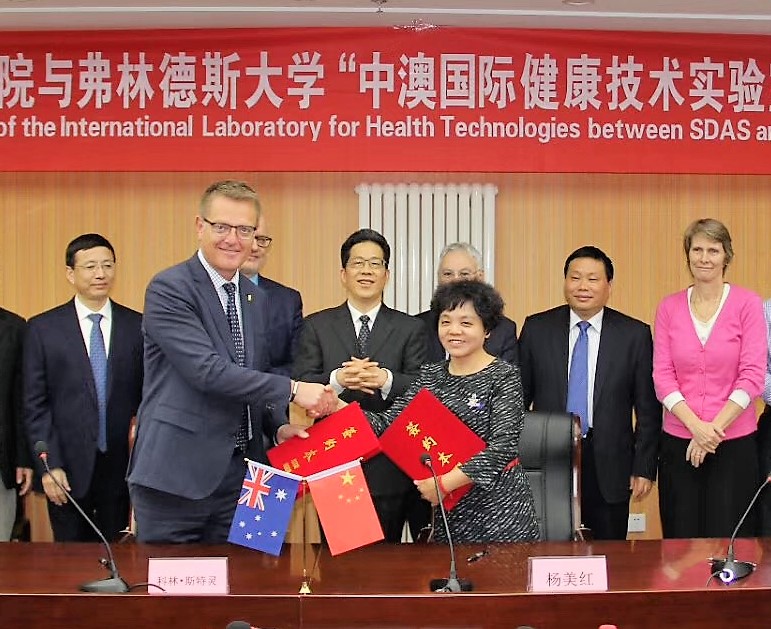[article by Flinders newsdesk]

Collaborative research with Shandong Academy of Sciences and Flinders University is expanding with the signing of a heads of agreement to establish the joint International Laboratory for Health Technologies.
The joint laboratory will lead to increased commercial opportunities for South Australian researchers, by creating a collaborative platform for the development of leading-edge medical technology enterprises in Shandong and South Australia.
It will focus on supporting the development of novel, internationally competitive medical devices, and will support traditional industries to develop and globalise local medical equipment and digital health technology.
This is the second joint laboratory Flinders University has signed with the Shandong Academy of Sciences and significantly expands the University’s successful engagement with China.
The International Laboratory for Health Technologies agreement facilitates a joint laboratory collaboration between Flinders University’s Medical Device Research Institute and the Academy’s Shandong Computer Science Center.
Flinders University Deputy Vice-Chancellor (Research) Professor Robert Saint says the International Laboratory for Health Technologies “brings together outstanding research strengths of Flinders University and our new partners at the Shandong Academy of Sciences”.
“This new initiative adds to existing research collaborations with the Academy, to create more exciting opportunities for transnational knowledge exchange and innovative research using the best of our complementary expertise and experience,” Professor Saint says.
The research focus over the next three years will include the development of:
- A flexible wearable electronic system to monitor multiple physiological functions including respiration, pulse and electrocardiogram, and blood oxygen.
- Key technologies of intelligent digital medical devices integrating biological sensing, optical monitoring, cloud computing and wireless technologies.
- Health big data key technology platform.
- Joint PhD programs.
The joint laboratory follows the establishment of the China-Australia Joint Laboratory for Native Bioresource Industry Innovation (or CANBI2) at the Shandong Academy earlier this year.
The State Government has committed $1.3 million to support joint laboratories between the Shandong Academy of Science and South Australia’s universities.
Two other agreements with the Shandong Academy of Science are also underway with the University of Adelaide for an agriculture and ecology joint laboratory, and the University of South Australia for an automation joint laboratory.
The signing of the International Laboratory for Health Technologies agreement in Jinan, Shandong Province, was attended by the Shandong Academy of Sciences (or SDAS) President Professor Yinglong Wang and Flinders University’s President and Vice-Chancellor, Professor Colin Stirling, Deputy Vice-Chancellor (Research) Professor Saint, Vice President and Pro Vice-Chancellor (International) Mr Sebastian Raneskold and Professor Wei Zhang, Professor Karen Reynolds and Associate Professor Youhong Tang from the College of Science and Engineering.
Flinders University expertise in digital health and personal medical technology as well as biomedical engineering and related health science research was also promoted at Nankai University, where Flinders has supported teaching programs for the past 17 years.
Nankai’s College of Life Sciences expressed interest in joining Flinders and the Shandong Academy in future research into the global opportunities in developing new and improved personal health devices.
The Flinders delegation also had a meeting with Nankai University President Gong Ke who has just become President of the World Federation of Engineering Association.

